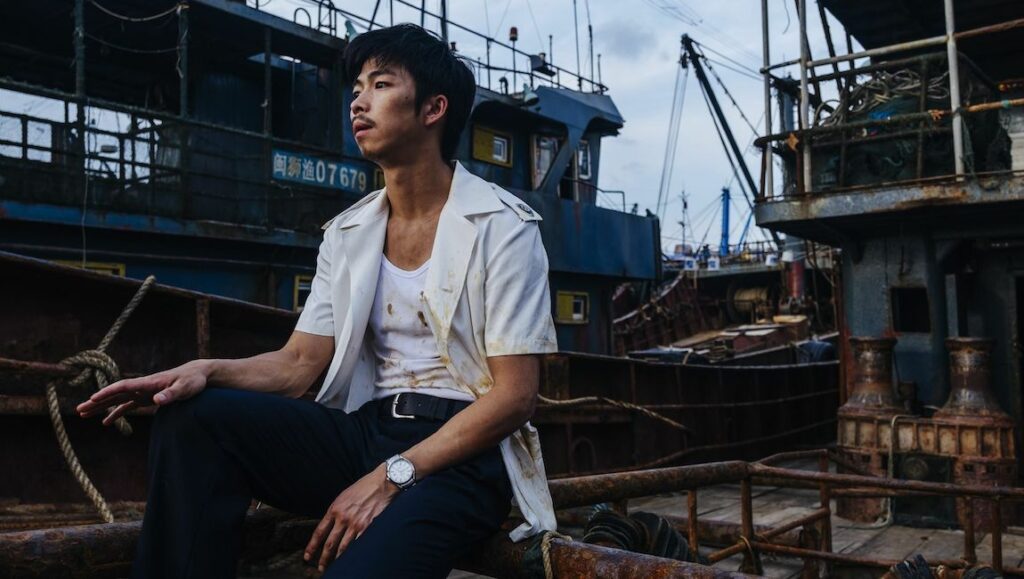Li Xiaofeng’s Back to the Wharf begins with a tragic accident that escalates, shockingly, to murder. After high school student Song Hao (Zhou Zhengjie) stumbles into the wrong house while searching for a friend, he comes across a drunk older man who believes he’s a robber. The man attacks, and in the midst of defending himself, a frantic Song Hao stabs the man and flees. His father Song Jianhui (Wang Yanhui) sees the aftermath of the struggle, and fearful that his son will be imprisoned and the family name ruined, finishes the injured man off instead of calling an ambulance. Now believing himself a murderer, Song Hao is shipped far away by his father, ending his chances at going to college and instead damning him to a life of crushing guilt and menial labor. Fifteen years later, Song Hao (now played by Zhang Yu) returns to his hometown for his mother’s funeral, only to find his father living with a much younger woman (“Your mother didn’t mind,” he says) and with a new, younger son. Song Hao reconnects with his childhood best friend, Li Tang (Lee Hong-Chi), who’s become a shady real estate developer and, unbeknownst to Song Hao or his father, witnessed their crime all those years ago.
This thriller scenario is rife with potential for revenge and blackmail, which Xiaofeng ultimately has little interest in exploring. Instead, Song Hao winds up meeting Pan Xiaoshuang (Song Jia), a woman who remembers him from school and seems determined to strike up a romance with him. Song Hao also stumbles across a young woman named Wan Xiaoning (Deng Enxi), who happens to be the now-teenaged daughter of Song Hao’s victim. The script is very busy, prone to implausible coincidences that are nonetheless partially inspired by several true-life stories of crime and corruption in small-town China. Everything here is rendered like a novel that’s got big chunks of narrative missing, as the film veers from crime saga to rom-com to family melodrama, with a deeply uninteresting main character at its center. Song Hao is supposed to be scarred by his past, but Yu plays him like a somnambulant zombie, seemingly unable to hold a conversation or make a decision. He’s entirely passive, with each of the film’s tertiary characters orbiting around him and acting off of him in some way. Yu simply isn’t charismatic enough to make this kind of quiet stoicism compelling, and while Song Hao’s relationship with Xiaoshuang is sweet enough, it never makes sense why she’d throw herself at him. Still, she’s got personality to spare, and as Song Hao gradually loosens up, the film follows suit. But like much of the film’s narrative, character arcs and story developments feel rushed or otherwise truncated. Soon, the two are married, and are having a baby shortly thereafter. Song Hao begins to tentatively reconnect with his aloof father, he seems to feel some regret for his part in what happened all those years ago. It’s only then that Li Tang comes forward and begins to blackmail Song Hao and his father, demanding that they expedite permits from the city for an illegal building project that will make Li Tang and his corrupt father very wealthy. It all comes out of nowhere, after the film is over halfway over, including a second murder that strains credulity.
Xiaofeng manages some striking compositions here and there: He frequently films characters placed amongst the city’s architecture so that individuals are isolated and separated from each other, while crisscrossing pedestrian walkways intersect and divvy up frames. These visuals are dynamic, suggesting that the city itself has enveloped or otherwise enclosed these people. Key events transpire during torrential downpours, like a kind of divine providence guiding these tragic events. And there’s a remarkable scene late in the movie that finds Song Hao fleeing a party where a drunken Li Tang has been terrorizing him; before literally jumping ship, Song Hao views a fireworks show through a latticework that makes him look like he’s behind prison bars, while the bright neon blues and reds and greens seem to represent a rosy future just out of his reach. But these visual grace notes are few and far between: Xiaofeng mostly settles on an unfussy, quotidian realism that’s largely uninspiring. The story leads eventually, inevitably, to tragedy, but the emotions don’t land like they should. Xiaofeng doesn’t seem to have much of a knack for this kind of long-form storytelling, where balancing plot with characters is of the utmost importance. A great modernist filmmaker like Jia Zhangke or a novelistic humanist Lee Chang-dong could elevate this material, certainly, but Xiaofeng is hardly on par with those masters. There are interesting ideas at play here, about the changing face of modern China and the corruption of fathers infecting their children, but Back to the Wharf is ultimately too tentative, too scattered in its storytelling to make much of these potentially rich thematic threads. Instead, the film ends with a grand, melodramatic gesture that’s supposed to be heartbreaking, but which instead simply connotes relief that the movie is finally over.
Published as part of Fantasia Fest 2021 — Dispatch 4.


Comments are closed.